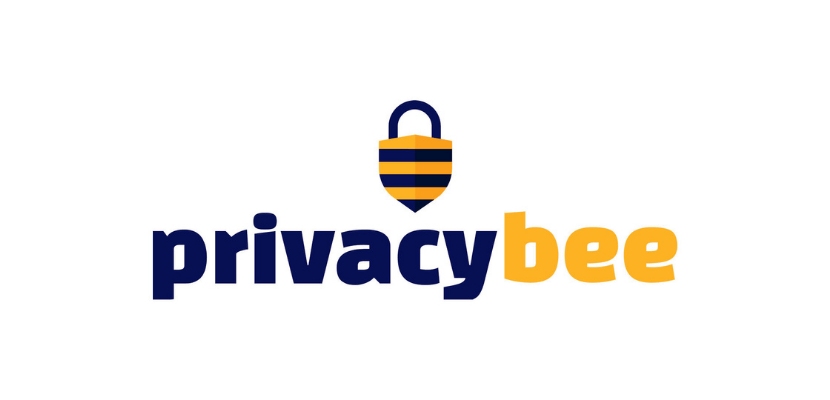
Privacy Bee is a premium-priced defense against the hundreds of sites selling your personal information, automating removals from 1,042 data brokers and people-search platforms, along with 182,674 custom sites to reduce spam, doxxing risks, and identity theft exposure.
You also gain extras like dark web monitoring, a free tracker-blocking browser extension, junk mail reduction, and tools to blur your home on Google Maps. With higher-tier plans required for full coverage and ongoing protection, does Privacy Bee justify its cost compared to cheaper alternatives in 2026? This hands-on review breaks down its performance, features, and real-world results to help you decide if it's the right fit.
| Website | privacybee.com/ |
| Availability | Worldwide |
| Coverage | 1,042+ |
| Core & Extra Features | Risk assessment, dark web tracking, ‘Active Do Not Track’ browser extension, marketing list removal |
| Support | Chatbot and email |
| Price | $8/mo. |
| Annual Price | $95 |
Key takeaways
Privacy Bee offers comprehensive data removal services that safeguard users’ personal information from a variety of online threats.
Its features include risk assessment, dark web monitoring, marketing list removal, and a powerful browser extension for tracker blocking.
- Despite higher prices than other privacy protection services, Privacy Bee is worth it for users who are looking for extra privacy features.
Here is a quick look at the pros and cons of choosing Privacy Bee:
Pros+
- Active Do Not Track browser extension for data privacy
- Comprehensive data broker coverage
- Family-friendly options
- Focused data breach detection
- Risk assessment features for free
- Industry opt-outs (like junk mail)
- Simple-to-understand reporting
Cons-
More expensive than some other privacy-protection services
- Focuses on the US market only
- Lower-priced subscription tier is somewhat limited
Privacy Bee feature overview
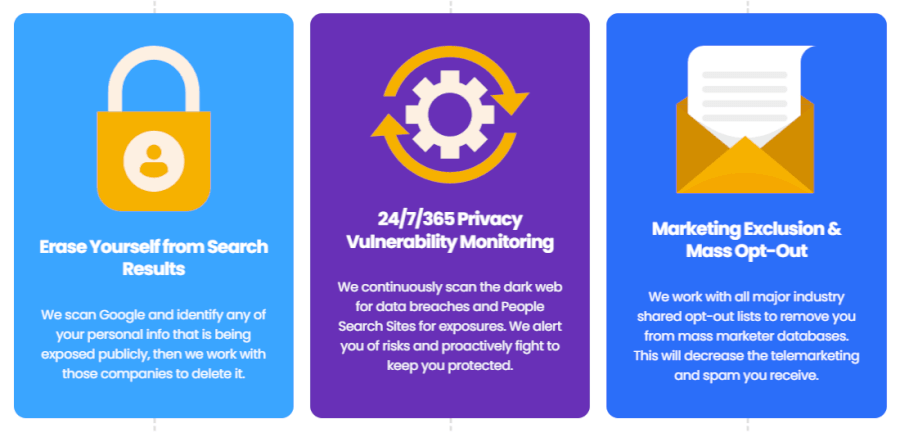
Not surprising considering the price, but Privacy Bee offers a wide array of features allowing you to scrub yourself from the web:
- Data broker removal: Allows you to eliminate your personal information from various online data broker databases.
- Risk assessment: Evaluates your online exposure and provides insight into the state of your digital privacy.
- Exposure dashboard: Offers a centralized view of your online presence.
- Marketing list removal: Assists in removing your information from marketing lists, reducing the influx of unwanted emails and advertisements.
- Dark web monitoring: Tracks instances of your exposed personal information on the dark web, alerting you to potential security breaches.
- Active Do Not Track browser extension: Empowers you to take control of your private data's usage by numerous companies.
Is Privacy Bee legitimate?

Privacy Bee hit the scene in 2020 and, despite its newcomer status, quickly gained a reputation that rivals more established services like DeleteMe. Headquartered in Atlanta, the team consists of over 50 privacy experts committed to helping you regain control of your online footprint.

Since its launch, Privacy Bee amassed numerous positive reviews and is widely regarded as one of the top data removal services in the industry. So, if you’re wondering if Privacy Bee is legitimate, the answer is a resounding yes. More importantly, it works as advertised.
How does Privacy Bee work?
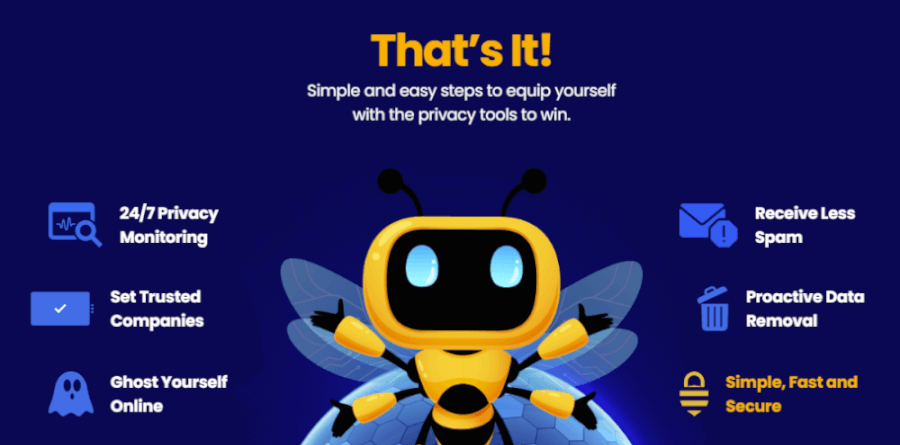
By leveraging automation, Privacy Bee quickly identifies and erases your data from data broker sites. It’s possible to do this on your own, but it requires a lot of manual labor. Plus, there’s a high possibility you’ll overlook quite a few broker sites. All in all, a data removal service is simply a more successful approach.
Once you set up your account, Privacy Bee will scan its data brokers' database to determine if any of your information is present on data brokerage sites. Once it discovers a hit, the service will present you with a list of websites you can choose to opt out of. Privacy Bee will then submit removal requests to de-list your personal information.
It doesn’t end there, though, as Privacy Bee also relies on follow-up procedures to make certain that the data is successfully wiped.
Features and benefits: What do you get with Privacy Bee?

With a robust set of tools in its arsenal, including proactive data privacy, data broker removal, and vulnerability monitoring, Privacy Bee is a competent companion in the quest to protect your sensitive data and online privacy.
Risk assessment and exposure dashboard
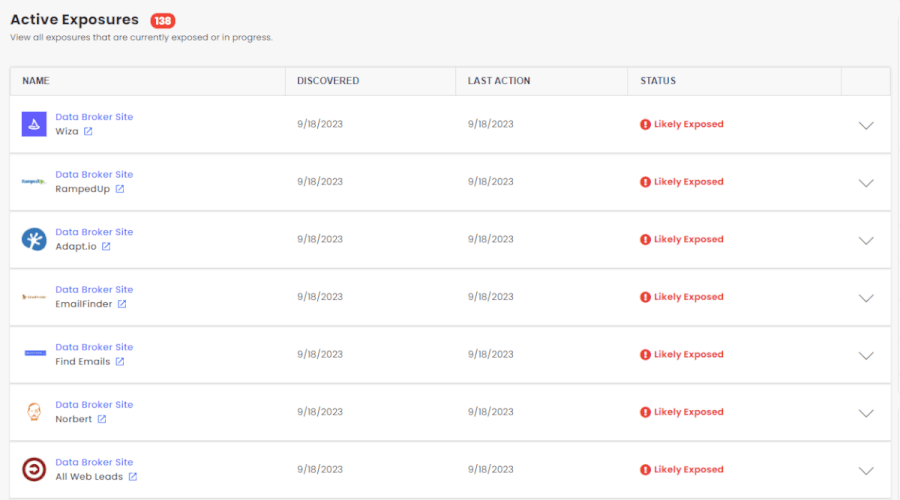
Privacy Bee offers a user-friendly risk assessment and exposure dashboard that provides a clear picture of your data exposure — something like a private digital security checkpoint at your fingertips.
With the privacy risk score feature, you'll receive a score that reflects your online privacy risk. It takes into account active risks and vulnerabilities that may have been exposed, and lists the steps you've taken so far to protect yourself.
The exposure history report provides a straightforward summary of any previously detected data exposures, helping you stay informed at all times about the state of your digital footprint.
Marketing list removal
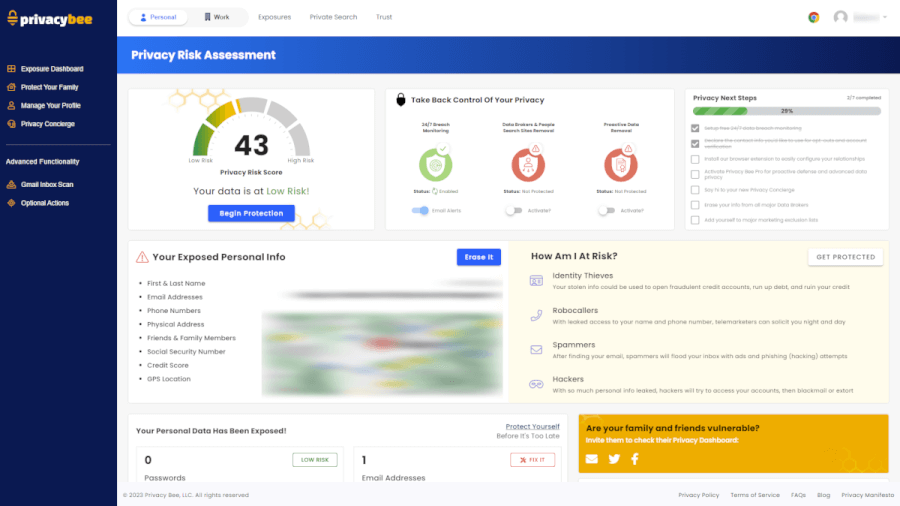
Privacy Bee's marketing list data deletion feature lets you take charge of your inbox and completely eliminate junk mail. The feature simplifies the process of opting out of marketing lists, but also goes a step beyond by supporting industry opt-outs that allow you to escape the grasp of marketing companies.
Dark web monitoring

One of the cornerstones of Privacy Bee's services is its dark web monitoring feature. This powerful tool empowers you to keep tabs on the mysterious corners of the internet, where personal information often pops up after a data breach.
It’s pretty simple – if any of your private data happens to surface on the dark web, Privacy Bee will notify you, allowing you to remediate the issue before your details fall into the wrong hands.
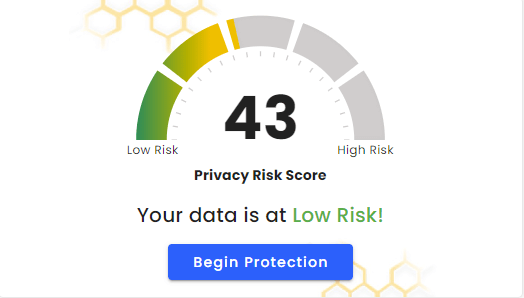
For those who want to stay ahead of potential threats and ensure their information remains safe and secure, dark web monitoring is an invaluable resource. Plus, there’s a privacy risk score tool that’s tailored specifically to you. This score is based on a meticulous analysis of active privacy risks, uncovered vulnerabilities, and the proactive steps you've taken.
Browser extension for tracker blocking

By disabling code on untrusted websites, the Privacy Bee browser extension actively prevents trackers from keeping tabs on your online activity. Best of all, it’s free and available on mainstream browsers. All you have to do is log into your Privacy Bee account and you’re set.

Email inbox scan

Gmail address owners can rejoice as they have an email scan feature at their disposal. It scans through your mailbox and finds websites you interact with regularly. Users can then specify which of these should have access to your information. In other words, you can stop certain companies from sending you emails. Dope!
Currently, Privacy Bee offers email scan functionality exclusively for Gmail users. But don't worry if you use Yahoo or Outlook – Privacy Bee has plans to roll out support for these platforms soon.
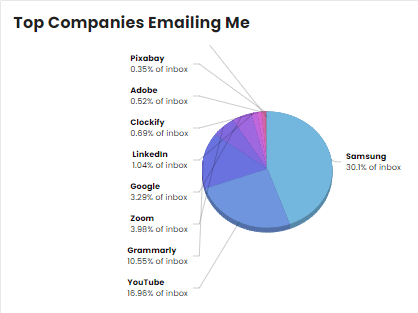
To set up the email scan feature, you'll need to enable IMAP with your email service provider and follow a few additional steps to get it all set up. Once you're up and running, you'll have the power to decide who stays in your email contacts list.
Data brokers covered
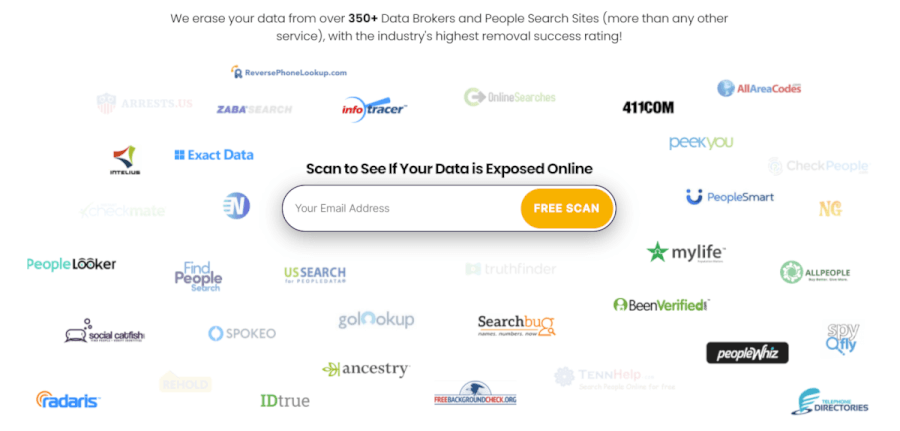
The vendor is known for its intensive data broker coverage. The latest (mid-February 2026) information from the company states that they contact over 1,000 data brokers. The number of removals you actually see will likely be far fewer, as is the case with any service that depends on getting data brokers to remove data.
Although a previous review stated that Privacy Bee coverage was limited to the United States, the service actually operates worldwide, with only a handful of countries that are sanctioned by the United States excluded. This wide and deep coverage is enough to perform a thorough cleanup, especially if you opt for a Pro plan that adds an extra 182k custom sites to the mix.

Privacy Bee doesn't leave you in the dark. Even without premium membership, you can click on each of the data brokers listed on the dashboard to access details about how to remove your personal data online.
Blurring your home from Apple Maps and Google Street View

Having your home for everyone to see can feel like an invasion of privacy. Fortunately, Privacy Bee lets you easily (and permanently) blur your home’s image from both Google Street View and Apple Maps.
Privacy Bee’s security measures and privacy policy: Is Privacy Bee safe to use?
Privacy Bee implements multiple technical and organizational security measures to safeguard personal data.
Ensuring data transmission security
The company employs Secure Socket Layer (SSL) encryption when transmitting data like passwords. While not 100% bulletproof, this security layer does help minimize the possibility of being targeted when your data is in transit.
Security measures and encryption
Besides SSL, Privacy Bee encrypts all databases housing user information. While the company doesn’t explicitly specify the encryption method used, it assures users that the service adheres to best cybersecurity practices.
Privacy Bee's privacy policy
At Privacy Bee, safeguarding your personal information is paramount. Thus, as the privacy policy confirms, user information is protected and is never disclosed with third parties.
If you want to find out more, you can check Privacy Bee's privacy policy for yourself. Also, don’t forget to take a look at Privacy Bee's privacy manifesto as well.
Customer support: What sort of help do you get with Privacy Bee?
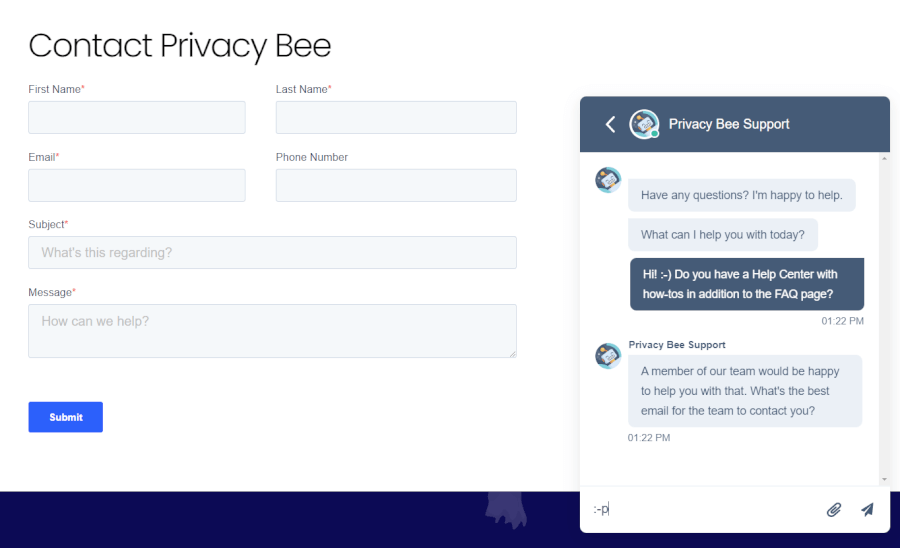
Privacy Bee provides various support channels suited for different user needs. You can get in touch with the support team via a contact form on the website, email, chatbot (requires an email address), and live phone support during US business hours.
Paid users also get access to the ‘Privacy Concierge’ feature, which extends the support to any privacy-related matters.
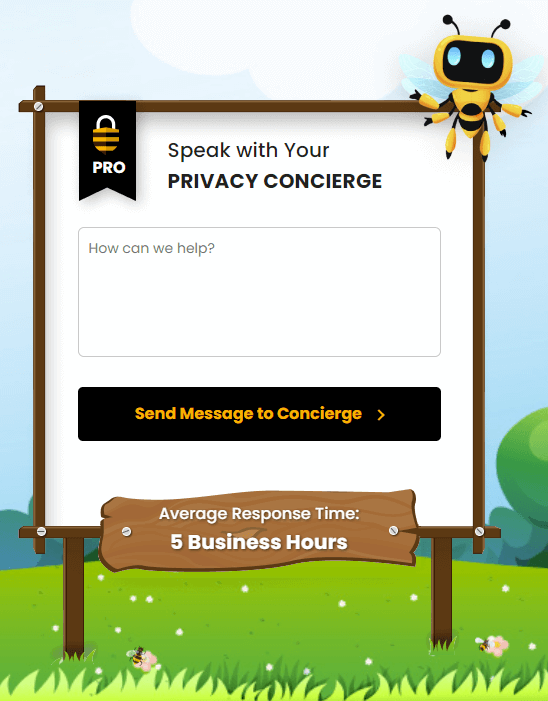
There are also numerous resources on the official blog, including nifty step-by-step guides packed with enough info to resolve most issues that may creep up in your data removal journey.
All in all, the customer support is top-notch.
Plans and pricing: Choosing the right option
In addition to a free privacy assessment that provides you with a quick overview of your digital footprint, Privacy Bee offers three pricing tiers. This is a welcome addition, as in the past, the company only offered a single one, which was more on the expensive side. Now, you get options that allow you to laser in on the optimal subscription.
| Duration | Essentials | Pro | Signature |
| 1-year | $8/month | $18/month | $799/month |
| 1-month | $19/month | $197 | $67/month |
The ‘Essentials’ plan offers the bare minimum, such as the dashboard, one monthly email report, and continuous monitoring. Though it doesn’t come with many bells and whistles, you do get access to the full data broker network.
On an annual basis, the plan costs about $95 ($8 per month) and represents the most economical option, as monthly billing bumps up the price to $19.
The flagship is the ‘Pro’ plan, which introduces all the powerful features we covered in this Privacy Bee review, such as dark web monitoring, mass marketing opt-outs, and numerous other capabilities. It also extends the coverage to include 182k custom sites.
If you require a fully customized, priority service, you might want to opt for the ‘Signature’ tier for $67 per month ($799 annually). While this is definitely a pretty penny (in the true definition of the word), it introduces faster takedowns, hands-on assistance from US-based privacy analysts, extra legal options, and the 24/7/365 SOC Escalation for critical exposures.
Privacy Bee also offers couples and family options at a small upcharge, as well as enterprise-grade protection for businesses.
Competition: What are the best alternatives to Privacy Bee?
Here are all the key differences between the best data removal services:
| Provider | Coverage | Availability | Extra features | Price |
| Privacy Bee | 1,000+ | Worldwide | Powerful browser extension, free risk assessment, dark web monitoring | $8/mo |
| DeleteMe | 750+ (569 are custom requests) | US, Australia, Belgium, Brazil, Canada, France, Germany, Ireland, Italy, the Netherlands, Singapore, UK | Email and phone masking, detailed privacy reports, custom removal requests | $10.75/mo annually $8.71/mo bi-annually |
| Incogni | 270+ | US, Canada, the UK, the Isle of Man, Switzerland, Norway, Iceland, Liechtenstein, and all of the EU | Detailed view of data brokers being contacted and request statuses, automatic repeat requests | $8.29 mo annually |
| Optery | 370+ (670 with premium) | US-only | Free tier available | $2.09/mo |
When it comes to safeguarding your personal information online, Privacy Bee faces competition from the likes of Incogni, Optery, and DeleteMe. Each has its own approach to strengthening online privacy and preventing data breaches.
While Privacy Bee allows you to control your data, Incogni takes it a step further by ensuring compliance with regulations like the California Consumer Privacy Act (CCPA) and the General Data Protection Regulation (GDPR). This legal compliance compels data brokers to erase personal information from their databases, offering greater peace of mind regarding your data.
Privacy Bee employs automated data removal requests to a wide range of companies, which can include those that might not have your data. DeleteMe, on the other hand, maintains a human element in its approach. Its privacy experts specifically locate sites where your data is publicly accessible and remove it, providing a more precise and efficient data removal process.
Moreover, Privacy Bee prides itself on submitting requests to over 1,000 data brokers and people search sites. Meanwhile, DeleteMe claims to cover over 750 data brokers but falls short on its promises as most of these requests fall into the category of custom requests.
Optery offers a number of plans, including a free edition. While Privacy Bee focuses on data broker removal and proactive scans for privacy violations, Optery places a strong emphasis on finding data brokers holding your data and assisting with its removal or guiding you through the opt-out process. Both services aim to locate and remove your personal data online, but Optery's pricing structure is a bit more budget-friendly.
While Privacy Bee’s entry-level subscription is relatively affordable, it’s also severely limited. To make the full use of Privacy Bee’s many features, you’ll unfortunately have to upgrade to the ‘Pro’ subscription that costs $18 per month.
Verify your progress: Check removals yourself
Privacy Bee's dashboard gives regular updates, but you can confirm results on your own for extra peace of mind. Start by searching for your name in incognito mode on major people-search sites like Spokeo, Intelius, or BeenVerified. Make note of which of your profiles appear before signing up, then recheck every few weeks.
You'll often see outdated or missing information emerge as opt-outs process, with full profiles vanishing over 1–3 months on active sites. Reduced spam emails, fewer robocalls, and cleaner inbox scans also signal real progress. This hands-on verification helps you track tangible wins and decide if Privacy Bee's automation delivers the ongoing protection you need. Given the price of a Privacy Bee subscription, you want to be sure you are getting your money's worth.
Privacy Bee review conclusion: Is Privacy Bee worth the cost in 2026?
Privacy Bee is a great method for individuals looking to keep personal information off the internet. Packed with powerful features, free tier, favorable privacy policy, and sporting one of the highest broker networks on the market, Privacy Bee is one of the most trustworthy data removal services around.
Sadly, to get the best value for your money, you’ll have to upgrade to the mid-price tier, which can be quite an investment at $18 a month. However, all the extra bells and whistles make up for what would otherwise be a significant drawback.
Privacy Bee has all the tools you need to safeguard your information, and as a direct result, reduce the risk of data breaches and identity theft. Since privacy is hard to come by these days, Privacy Bee is a saving grace as it allows regular people to take full control over their digital footprint.
Other data removal guides:
- Best Data Removal Services
- Optery Review
- DeleteMe Review
- Incogni Review
- Privacy Bee vs Incogni
- Incogni vs Optery
- Optery vs DeleteMe
- How to Delete Your Digital Footprint
- How to Delete Yourself from the Internet
- How to Massively Reduce Junk Email and Spam
- How to Not Get Doxxed
- How to Opt Out of Whitepages
- How to Stop Spam Calls and Robocalls
Frequently Asked Questions
Privacy Bee compiles privacy opt-outs from across the internet, creating a growing database of companies. You'll then receive the results in your dashboard, allowing you to select databases which you want to opt out of.
To create a Privacy Bee account, you need to provide your email, first and last name, birthday, and home address. Privacy Bee will only use this information to remove your data, so no worries here.
Privacy Bee sends out data removal requests every 60 days to maintain the consistent deletion of personal information.
Yes, Privacy Bee provides a free privacy evaluation to help you assess your privacy risks before deciding to commit to their service.
Privacy Bee's tracker-blocking browser extension is compatible with Chrome, Firefox, and Edge. It can’t be used on all browsers.
The Privacy Concierge service offers tailored support for premium users of Privacy Bee who require help in managing their privacy settings.

Leave a Reply